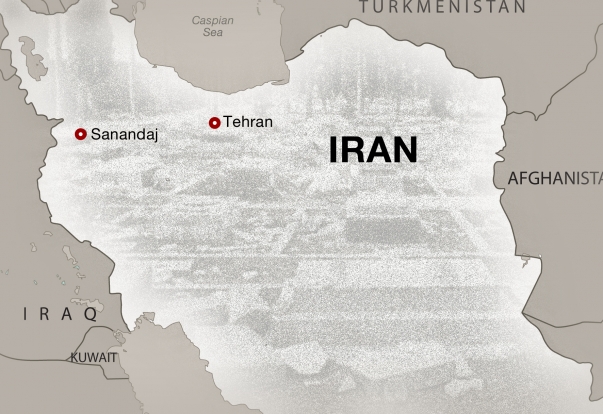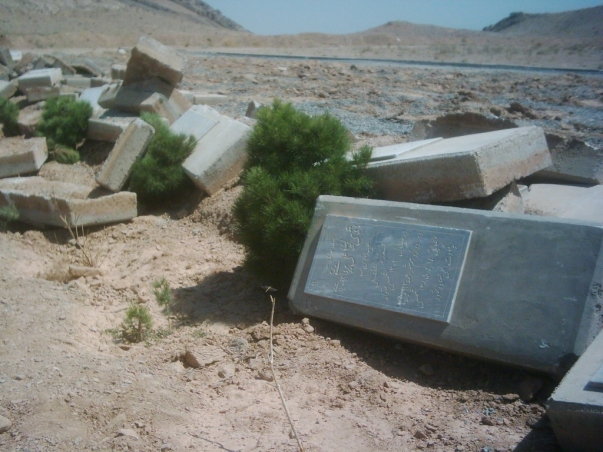
[BWNS, 19 Jan. 2012] GENEVA — Eighteen years ago, Baha’is in the Iranian city of Sanandaj were allocated a one-hectare parcel of barren land at the side of a road for use as a cemetery.
This rocky mountainside, devoid of vegetation, was hardly prime real estate but – after the first burial there in the autumn of 1993 – local Baha’is got together to landscape the site, dig out the rocks and replace the soil. They planted and watered by hand 250 cypress and fir saplings, contributed by the Office of Agriculture. They installed electricity and built a small room where bodies could be prepared for burial.
At every step of the way, proper permits were obtained. When the Baha’is wanted to dig a well, permission was sought and granted from the regional water board. At every expiry date, the permit was correctly renewed.
Impressed by the transformation of the site, the Office of Natural Resources suggested that the Baha’is consider planting trees on public land adjacent to the cemetery, thereby expanding the green zone. As a result, the largely Sunni Muslim residents of Sanandaj came to respect the place as a symbol of the Baha’i community’s peaceful presence in their city.
But now, the area’s beauty and greenery appears to have instigated a change in official attitudes. Authorities want to repossess the cemetery, reasserting the state’s claim on the land – even though Baha’is were once granted the deeds. An order for it to be confiscated, and the buildings and graves to be destroyed, will be heard in court at the end of this month.

Recent harassment of Baha’is in Sanandaj does not bode well for the verdict. On 19 December, Ministry of Intelligence agents carried out early morning raids on 12 Baha’i homes in the city. Baha’i books, pamphlets and photographs were confiscated, along with compact discs, audio cassettes, computers, mobile telephones, computer drives, and various personal documents.
“In the light of this upsurge of persecution of the Sanandaj Baha’i community, it looks like the fate of the cemetery has already been decided at the order of the Ministry of Intelligence,” said Diane Ala’i, the Baha’i International Community’s representative to the United Nations in Geneva.
In an announcement on 17 January, the Human Rights Organization of Kurdistan called upon the authorities to practice “tolerance and acceptance of other beliefs.” It described the “new wave of pressure and restraints against the Baha’i community” as “inhumane and illegal actions…in violation of civil and political rights treaties and conventions.”
Disturbing the departed
Under Iran’s present regime, the case of Sanandaj is not unique. Since 2007, there have been more than 30 incidents of vandalism, arson, or other problems related to Baha’i-owned cemeteries or efforts by Baha’is to properly bury their dead.
“Not content with only persecuting the living, the Iranian authorities seek to disturb the peace of even those who have passed on,” said Ms. Ala’i. “This is the latest in a long string of attacks on Baha’i cemeteries and burial rites. All are in complete violation of international standards of human rights and any decent person’s understanding of respect for the dead.”
Among recent examples:
– A newly established cemetery in Sangsar, Semnan Province, given to local Baha’is by the municipality, was vandalized by unknown intruders in March 2011. The graves were piled high with dirt, the trees were uprooted, and the two small rooms were destroyed.
– In July 2010, graves in the Baha’i cemetery of Jiroft, Kerman Province, were destroyed by unknown intruders using bulldozers.
– In late May 2010, the Baha’i cemetery in Mashhad was vandalized at night using a front-end loader and other heavy machinery. The cemetery’s walls, the mortuary, and the place where prayers were recited were severely damaged.
Other incidents have involved efforts by authorities to interfere with Baha’i burial rites.
In Tabriz, for example, Baha’is had been allowed access to the city’s public cemetery for years. In August last year, the family of a recently deceased Baha’i woman was told that she would have to be interred with Muslim rites. The woman’s remains had to be buried in a Baha’i cemetery in another town. A similar incident occurred last October when the body of a Baha’i man was taken from Tabriz to another Baha’i cemetery some 100 kilometers away and buried without his family being informed.
“Iranian officials in international fora consistently claim that Baha’is are not treated differently from others and are only ‘punished’ when they do something illegal,” said Diane Ala’i. “What precisely have these dead people done to deserve such treatment?”
“The beautification of the cemetery in Sanandaj and its surroundings is evidence of the sincere and positive contribution Iranian Baha’is wish to make to their country. What is equally evident is that the authorities find such a thing impossible to accept.”
Baha’i World News Service coverage of the persecution of the Baha’is in Iran
The Baha’i World News Service has published a Special Section which includes further articles and background information about Iran’s campaign to deny higher education to Baha’is. It contains news of latest developments, a summary of the situation, profiles of imprisoned Baha’i educators, feature articles, case studies and testimonials from students, resources and links.
Another Special Report offers articles and background information about the seven imprisoned Iranian Baha’i leaders – their lives, their imprisonment, trial and sentencing – and the allegations made against them. It also offers further resources about the persecution of Iran’s Baha’i community.
The International Reaction page of the Baha’i World News service is regularly updated with responses from governments, nongovernmental organizations, and prominent individuals, to actions taken against the Baha’is of Iran.
The Media Reports page presents a digest of media coverage from around the world.
—
Source: http://news.bahai.org/story/881
January 28, 2012 1:45 am
The outrageous and unimaginable behaviour of authorities in Sanandaj city regarding repossessing yet another established Baha’i cemetery!! Is not an isolated issue, rather a calculated and intensifies hatred-inciting against Baha’is by the Islamic republic of Iran.
A careful study and follow up on human rights abuse against Baha’is in Iran will reveal that the authorities in that country have taken similar desperate action against Baha’is almost in all cities and regional areas in the country. The arrest and imprisonment of Baha’i academics involved in providing higher education for Baha’i youth, through a legitimate online university, who are deprived from entering normal higher education system in Iran, is another example of this ongoing inhuman behaviour of Iranian authorities against its own people.
Same pattern of shameless behaviour being repeated by the Iranian authorities over and over again: Authorities give the Baha’is a parcel of land far away from any urban facilities in a rocky mountainside (with the intention that the Baha’is will not survive the harsh condition!) as a cemetery and Baha’is put their heart and soul to develop the area and then after many years repossess the place and repeat the same disrespect behaviour with dead bodies ( of Baha’is ) as they do with them when they are alive! Then the authorities allow the Baha’is to start a higher education institution to educate young Baha’is for offering a better service to the country, once again, suddenly authorities change their mind, attack and arrest the academics and administrators, who put their heart and soul in providing higher education for the betterment of country, close the Baha’i university and imprison the innocent and hard working people with a fabricated charges such as dangerous to the security of the country and other similar charges that all are too familiar for everyone around the world!
All these strange and extremely shameful and brutal behaviour by the Iranian authorities and its hatred-inciting elements is nothing but a sign of desperation and frustration by the authorities. The determination and resolution of the Baha’i community in Iran in NOT taking any revenge or violent action against all outrageous and brutal behaviour of the authorities will continue to confuse Iranian Islamic government and at the same time it will continue to gain international support in defending the Iranian Baha’is by many governments, organisations and individuals around the world.